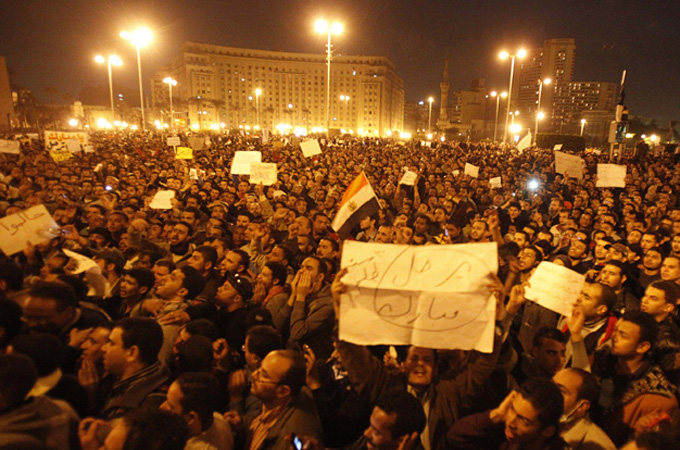US envoy meets ElBaradei
Ex-ambassador, who is in Cairo to reinforce US message to Mubarak government, has held talks with opposition figure.

 |
| Protests across Egypt urging Hosni Mubarak to step down have been continuing for days [Reuters] |
The former US ambassador to Egypt has held talks with Mohamed ElBaradei, the former head of the UN nuclear watchdog turned democracy advocate, in the Egyptian capital Cairo, according to reports.
Tuesday’s meeting comes just days after the prominent opposition leader offered to lead a transitional government, following unprecedented anti-government protests.
The US state department said Frank G Wisner, the ambassador to Egypt from 1986 to 1991, would have the opportunity to reinforce the US message to Egypt.
PJ Crowley, the US state department spokesman, said on Monday that given Wisner’s “expertise, we have asked him to add his perspective to our analysis on current developments … And we look forward to hearing his views when he returns”.
He also said the Washington believed Egypt should revoke emergency law brought in following mass protests against the government.
Robert Gibbs, the White House spokesman, dismissed Monday’s move by Hosni Mubarak, the Egyptian president, to appoint a new government, saying the situation in the country called for action, not appointments.
The White House is calling for free and fair elections in Egypt, but refusing to say whether the Washington believes Mubarak should run in those contests.
Mubarak named a new cabinet on Monday in an attempt to quell the ongoing demonstrations against his rule.
‘Egypt needs change’
Speaking to Al Jazeera on Tuesday, Alistair Burt, the UK’s parliamentary under-secretary of state for the Foreign Office, said that while the UK was watching events in Egypt with “great interest”, it was “not for the British government to decide who should be running other countries”.
He said that it was “plain that Egypt needs reform, needs change”, and that “the process of reform [started by Mubarak] should be substantiated by decisions from the government”.
“Our first concern is that there should be no violent response against those who are demonstrating peacefully. We’d like to see freedom of expression, the internet released [sic] and the access of people to all media.”
‘Legitimate grievances’
Earlier, EU foreign ministers called for “peaceful dialogue” between the protesters and the government.
Catherine Ashton, the bloc’s foreign affairs chief, said: “There needs to be a peaceful dialogue, an open dialogue to actually move forward.
“We have worked closely with Egypt over many years to offer international support and we will be there for the short, medium and long term to help build democracy, the rule of law, all of those values coming into action.”
Ashton said that the “legitimate grievances” of Egyptians should be heeded and that it was for the people of Egypt to determine their future and future leadership.
She said that it was not the EU’s role to tell Egyptians what to do.
Trinidad Jimenez, Spain’s foreign minister, added that the EU supports the “people who are in the street”.
“We support the claiming in the street for more reforms and more rights,” he said.
Concern over economy
Britain separately warned Egypt that repression of anti-government protests would “end badly” but did not call for Mubarak to stand aside.
“It’s sensible to say that you do have a choice here, this repression, if you opt for that, that will end badly for Egypt, badly for the world,” David Cameron, the British prime minister, said.
Earlier, Franco Frattini, Italy’s foreign minister, urged Egyptians to “choose democracy and civil rights, not extremism, not radicalism”.
Despite having usually close ties to Egypt the bloc has sought to distance itself from Mubarak and his adminstration.
However it has been criticised for not being bolder or more direct towards the Egyptian leader.
Foreign ministers have urged Mubarak to embark on reform in his country but stopped short of demanding he leave.
The impact of the protests on the Egyptian economy are of concern to Europe, with fears that rising energy prices could hit the region’s economic recovery.
“It’s not just oil that Egypt is important for, albeit not as a producer but as a supply conduit,” Dan Lewis, a UK based Energy Analyst, said.
“What’s really interesting is that eight per cent of global seaborn trade goes through the Suez Canal and if that were to shut down what this means is seaborne trade will take 18 days longer reach Europe and ten days longer to reach America.”
Gibbs said said national security officials were monitoring a range of commodities as they evaluate the impact of the unrest in Egypt on world oil and financial markets.
He did not specify what commodities the council was watching but noted that Egypt is not a significant oil producer and said no disruption of traffic on the Suez Canal had been noted thus far.
Assistance in Tunisia
“We cannot export revolution,” said Jean Asselborn, Luxembourg’s foreign minister said.
“I’m certain the European Union today will signal to people of good will in Egypt and Tunisia that we’re ready to help organise elections, but not to interfere.”
Ministers moved on Monday to freeze the assets of Zine El Abidine Ben Ali, the ousted Tunisian president, and his wife.
The sanctions could be extended to other people considered to have misappropriated state funds.
Brussels will host the North African nation’s new foreign minister on Tuesday, where Ashton is expected to offer assistance in organising elections in Tunisia.
The EU is also expected to look at ways to offer better trade terms to Tunisia to strengthen the country’s economy.
“Since the events in Tunisia, I am following with great attention the developments in the region,” Herman Van Rompuy, the EU president, said this weekend.
Italy’s Frattini said he would eventually like the EU to send a high-level delegation to all countries across the Mediterranean facing “disorders”.
“A mission to hear, to encourage, not to dictate,” he said.